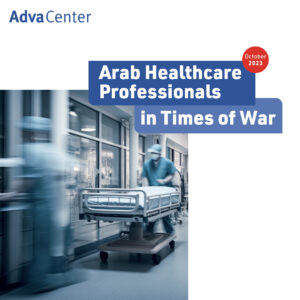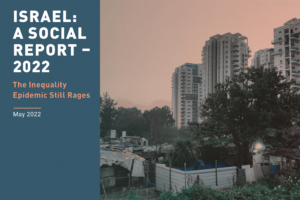It is incumbent upon us to remember that contribution and to strengthen that cooperation in ordinary times as well as in emergencies
In times of distress or crisis, the importance of Arab Israeli healthcare professionals as a crucial national resource is notable.
The percentage of Arab Israeli physicians in Israel has been on the increase. By the end of 2021, Arab physicians constituted 24% of Israeli doctors aged 67 and younger. That same year, 43% of new licenses for physicians were awarded to Arab and Druze doctors. The share of Arab citizens in other healthcare professions is also considerable.
In times of war, as in other crisis periods such as the COVID-19 pandemic Arab Israeli medical professionals serve as a vital resource in service of the state. During their work, these professionals ignore the political exclusion of Arabs (they are not currently represented in the government), as well as their exposure to the crossfire of members of organized crime operating in their communities.
They fulfill their roles in accordance with their Hippocratic oath, which requires them to care for every human being, regardless of religion or ethnic origin. They are now working around the clock, often filling in for Jewish physicians called up to serve in the reserves.
These professionals are rarely thanked by the government of Israel and their chances of becoming citizens with equal civil rights once the war ends are negligible. Thus, following the November 2022 national elections, the coalition agreement between the Likud and its right-wing and religious partners included a statement that “affirmative action” in acceptance to medical schools would be instituted for IDF veterans (most of them Jewish) – an absurd reaction to the high percentage of Arab physicians in Israel.
Arab Israelis’ contribution to the health sector is essential
Thus, to give just one more updated example of the inequality of their civil rights, the Finance Ministry has been withholding budgets that were supposed to be transferred from the Interior Ministry to Arab municipalities.
The need for Arab Israeli healthcare professionals is not temporary and will not cease with the end of the present war. In 2020, Israel had 3.31 active physicians per 1,000 residents, lower than the OECD average of 3.64. Up until a few weeks ago, one could hear many Jewish physicians expressing their intent to relocate abroad, in reaction to the judicial overhaul. If such intents were realized, the situation in Israel with regard to healthcare professionals would be expected to worsen and the dependence on Arab professionals to deepen.
Arab Israeli healthcare professionals, “soldiers in white” in the words of Arab Israeli journalist Furat Nassar, provide Arab Israeli patients in public hospitals with the experience of a respectful and equitable relationship aling with a feeling of security.
That experience serves as a pillar of strength for the Arab population of Israel in a country where this population is still neglected or excluded in many areas. At the end of every working day, Arab Israeli healthcare professionals return to their homes in localities that have ceased to be safe havens: It should be remembered that in the last 11 years, from June 2012 to the end of June 2023, no fewer than 856 Arab Israeli men and 143 Arab Israeli women were murdered in their own communities by other Arab Israelis.
Hospitals, the places in which so many individuals experience pain and illness, are also the places of cooperation between Jewish and Arab physicians. It is incumbent upon us to remember that and to strengthen that cooperation in ordinary times as well as in emergencies.
It is an important element of a democratic state.
// The English version of this article was originally published in the Jerusalem Post.




